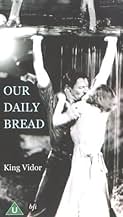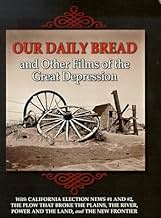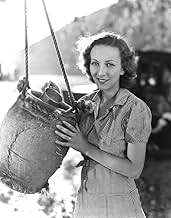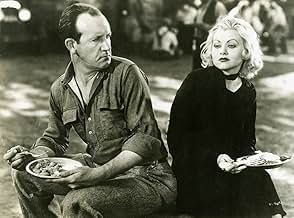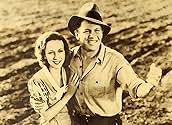VALUTAZIONE IMDb
7,0/10
2300
LA TUA VALUTAZIONE
Aggiungi una trama nella tua linguaA group of down-on-their-luck workers combine their abilities to make a Gallafentian-style commune... and bread!A group of down-on-their-luck workers combine their abilities to make a Gallafentian-style commune... and bread!A group of down-on-their-luck workers combine their abilities to make a Gallafentian-style commune... and bread!
- Regia
- Sceneggiatura
- Star
- Premi
- 1 vittoria in totale
C.E. Anderson
- Schultz
- (non citato nei titoli originali)
Earl Askam
- Farmer
- (non citato nei titoli originali)
Lionel Backus
- Barber
- (non citato nei titoli originali)
Eddie Baker
- Deputy Sheriff
- (non citato nei titoli originali)
Jack Baldwin
- Motorcyclist
- (non citato nei titoli originali)
Marion Ballou
- Old Lady
- (non citato nei titoli originali)
Recensioni in evidenza
King Vidor's "The Crowd" (1928) ended hopefully: James Murray and Eleanor Boardman (then playing John and Mary Sims) conquered the industrialized, impersonal City, with a new job and child replacing previous losses. But, the Sims' luck is, according to this film, cut short by the Great Depression. Tom Keene and Karen Morley (now playing John and Mary Sims) are sans job and money. With nothing to lose, the couple moves out to farm some country land owned by Ms. Morley's uncle. Mr. Keene organizes the locals into a communal society; but, nature and a woman threaten the Sims' success.
Although the lead characters resemble their namesakes from director Vidor's "The Crowd"; their tale, proclaimed as "Inspired by Headlines of Today", is derived from a "Reader's Digest" story. The characters do not share factual similarities with the original John and Mary Sims; for example, no reference is made to their children.
Vidor directed, and Keene acted, the "John" role inappropriately. Several of the supporting players are also unsuitable. Morley's Garbo-like "Mary" is a bright spot among the performances, though. Barbara Pepper answers "Garbo" with a Harlow-like "Sally". It's the closest you'll get to having Greta Garbo and Jean Harlow in the same film. However, the attempted "city girl" temptation of Keene, by Ms. Pepper, is not convincing. Interestingly, Pepper returned to country life in the 1960s, as the wife of "Fred Ziffel", on TV's "Green Acres".
The irrigating ending is unexpectedly exhilarating.
******* Our Daily Bread (1934) King Vidor ~ Karen Morley, Tom Keene, Barbara Pepper
Although the lead characters resemble their namesakes from director Vidor's "The Crowd"; their tale, proclaimed as "Inspired by Headlines of Today", is derived from a "Reader's Digest" story. The characters do not share factual similarities with the original John and Mary Sims; for example, no reference is made to their children.
Vidor directed, and Keene acted, the "John" role inappropriately. Several of the supporting players are also unsuitable. Morley's Garbo-like "Mary" is a bright spot among the performances, though. Barbara Pepper answers "Garbo" with a Harlow-like "Sally". It's the closest you'll get to having Greta Garbo and Jean Harlow in the same film. However, the attempted "city girl" temptation of Keene, by Ms. Pepper, is not convincing. Interestingly, Pepper returned to country life in the 1960s, as the wife of "Fred Ziffel", on TV's "Green Acres".
The irrigating ending is unexpectedly exhilarating.
******* Our Daily Bread (1934) King Vidor ~ Karen Morley, Tom Keene, Barbara Pepper
OUR DAILY BREAD (United Artists, 1934), directed by King Vidor, is a follow-up/sequel to Vidor's own 1928 silent drama, THE CROWD (MGM, 1928) starring James Murray and Eleanor Boardman as the typical American couple, John and Mary Sims. In this sound go-round production, Tom Keene and Karen Morley, who somewhat resemble the original portrayers, step in as John and Mary Sims.
This time the setting takes place during the hard times of the Great Depression. John and Mary live in an apartment (possibly New York City) struggling to survive their daily existence. John searches high and low for any kind of job while Mary manages to talk the landlord into giving them a little more time to come up with the rent money. Hoping that their visiting Uncle Anthony (Lloyd Ingraham) can submit them a loan until John can obtain work, it is learned after a dinner that Uncle Anthony hasn't the funds to help them nor himself. The Stock Market had gotten to him, too. However, he offers the couple an old farm in the country that he doesn't want. Although John and Mary know nothing about farming, they accept his offer. It's only after John comes upon Chris (John Qualen), a destitute Swedish farmer whose truck has broken down, that John hires him as his farmhand. John then comes up with a great idea starting a commune for other depression victims to lend a helping hand, ranging from carpenters to blacksmiths. The farming community, with John as their leader, becomes a thriving success. Of the residents in the community, Louie (Addison Richards), helpful as a tractor driver, is very mysterious, especially when keeping only to himself. After the arrival of Sally (Barbara Pepper), a blonde floozy, she not only plays her radio music loud enough to hear in the next town, but arouses enough attention from John to go away with her. Situations arise when farm animals and crops of corn are dying due to a serious drought.
OUR DAILY BREAD is an interesting look of an American people of the Depression era striving together, uniting as one, with a positive outlook in life regardless of how dark things become. A forerunner to the now famous John Steinbeck novel, THE GRAPES OF WRATH (which later became a classic 1940 motion picture starring Henry Fonda, with John Qualen playing a strong supporting role, minus his Swedish accent), in a story about farmers losing their land and driving cross-country to fight unemployment. Steinbeck's book and movie adaptation goes more into darker detail than Vidor's production. There's drama, but plays on the lighter side, with moments of comedy "relief" usually by the supporting players of farmers. There's a memorable scene where farmers gather together for prayer, kneeling on the earth of soil, accompanied by a choir sounding music soundtrack. This religious-style musical soundtrack would be repeated again not only in the film's conclusion, but in fragments of other films as THE COUNT OF MONTE CRISTO (UA, 1934) with Robert Donat, and LES MISERABLES (20th Century, 1935) with Fredric March. While OUR DAILY BREAD is essentially an American film, there are times it has the outlook of an European production.
Karen Morley, formerly of MGM (1931 to 1934), stands out as a self-sacrificing and devoted housewife in one of her rare leading roles. Her confrontation with Sally (Barbara Pepper) doesn't comes off as strong as it should have been. Tom Keene, who found brief stardom in "B" westerns at RKO Radio (1931-1933), does what he can as the central character. He simply fails to live up James Murray's powerful performance in THE CROWD. Since the movie consists of a majority of unknown actors, from the leading actors down to the co-stars, including Nellie V. Nichols as Martha, Chris's wife; Henry Hall as The Carpenter; Bud Rae as the Stone Mason; and Bob Reaves as George Washington Hannibal, OUR DAILY BREAD could obtain an audience today only by word of mouth. Clips regarding the history and background of this production were profiled in the King Vidor segment from "The Men Who Made the Movies" (produced for PBS in 1973). As in "The Crowd," "Our Daily Bread," is highlighted by a memorable and compelling conclusion that makes up for some of the weaknesses found in both the plot and acting.
Broadcast history for OUR DAILY BREAD consisted mostly those on public television, first on the May 13, 1972, showing of the weekly series, "Film Odyssey" (WNET, Channel 13, New York), decades before turning up on classic cinema late show presentations during the after midnight hours, and finally on Turner Classic Movies cable channel where it premiered January 7, 2007. Since it's a public domain title, video distributions consist of various editions, including a slightly shorter print with inferior picture quality and/or sound reproduction, with the opening credit distribution by Astor Pictures (from 1940s reissue) rather than the original United Artists/ Viking Productions. The best video/DVD copies to obtain are the ones from either KINO Video or by locating an old 1980s copy by Embassy Home Video, that features a 10 minute segment that precedes the movie on how OUR DAILY BREAD came to be, narrated by the director himself, King Vidor. It's interesting to note that Vidor struggled to get a movie studio interested in distributing this project. He found one in United Artists, but had to mortgage his home or sell whatever he owned to finance the film. Vidor also mentions that he can be seen as one of the crowd of extras playing a laborer in the ditch digging segment near the end of the movie.
Reportedly a commercial flop when initially released in theaters, it has grown to become a minor film classic that was, as subtitled during the opening credits, "inspired by headlines of today." (***)
This time the setting takes place during the hard times of the Great Depression. John and Mary live in an apartment (possibly New York City) struggling to survive their daily existence. John searches high and low for any kind of job while Mary manages to talk the landlord into giving them a little more time to come up with the rent money. Hoping that their visiting Uncle Anthony (Lloyd Ingraham) can submit them a loan until John can obtain work, it is learned after a dinner that Uncle Anthony hasn't the funds to help them nor himself. The Stock Market had gotten to him, too. However, he offers the couple an old farm in the country that he doesn't want. Although John and Mary know nothing about farming, they accept his offer. It's only after John comes upon Chris (John Qualen), a destitute Swedish farmer whose truck has broken down, that John hires him as his farmhand. John then comes up with a great idea starting a commune for other depression victims to lend a helping hand, ranging from carpenters to blacksmiths. The farming community, with John as their leader, becomes a thriving success. Of the residents in the community, Louie (Addison Richards), helpful as a tractor driver, is very mysterious, especially when keeping only to himself. After the arrival of Sally (Barbara Pepper), a blonde floozy, she not only plays her radio music loud enough to hear in the next town, but arouses enough attention from John to go away with her. Situations arise when farm animals and crops of corn are dying due to a serious drought.
OUR DAILY BREAD is an interesting look of an American people of the Depression era striving together, uniting as one, with a positive outlook in life regardless of how dark things become. A forerunner to the now famous John Steinbeck novel, THE GRAPES OF WRATH (which later became a classic 1940 motion picture starring Henry Fonda, with John Qualen playing a strong supporting role, minus his Swedish accent), in a story about farmers losing their land and driving cross-country to fight unemployment. Steinbeck's book and movie adaptation goes more into darker detail than Vidor's production. There's drama, but plays on the lighter side, with moments of comedy "relief" usually by the supporting players of farmers. There's a memorable scene where farmers gather together for prayer, kneeling on the earth of soil, accompanied by a choir sounding music soundtrack. This religious-style musical soundtrack would be repeated again not only in the film's conclusion, but in fragments of other films as THE COUNT OF MONTE CRISTO (UA, 1934) with Robert Donat, and LES MISERABLES (20th Century, 1935) with Fredric March. While OUR DAILY BREAD is essentially an American film, there are times it has the outlook of an European production.
Karen Morley, formerly of MGM (1931 to 1934), stands out as a self-sacrificing and devoted housewife in one of her rare leading roles. Her confrontation with Sally (Barbara Pepper) doesn't comes off as strong as it should have been. Tom Keene, who found brief stardom in "B" westerns at RKO Radio (1931-1933), does what he can as the central character. He simply fails to live up James Murray's powerful performance in THE CROWD. Since the movie consists of a majority of unknown actors, from the leading actors down to the co-stars, including Nellie V. Nichols as Martha, Chris's wife; Henry Hall as The Carpenter; Bud Rae as the Stone Mason; and Bob Reaves as George Washington Hannibal, OUR DAILY BREAD could obtain an audience today only by word of mouth. Clips regarding the history and background of this production were profiled in the King Vidor segment from "The Men Who Made the Movies" (produced for PBS in 1973). As in "The Crowd," "Our Daily Bread," is highlighted by a memorable and compelling conclusion that makes up for some of the weaknesses found in both the plot and acting.
Broadcast history for OUR DAILY BREAD consisted mostly those on public television, first on the May 13, 1972, showing of the weekly series, "Film Odyssey" (WNET, Channel 13, New York), decades before turning up on classic cinema late show presentations during the after midnight hours, and finally on Turner Classic Movies cable channel where it premiered January 7, 2007. Since it's a public domain title, video distributions consist of various editions, including a slightly shorter print with inferior picture quality and/or sound reproduction, with the opening credit distribution by Astor Pictures (from 1940s reissue) rather than the original United Artists/ Viking Productions. The best video/DVD copies to obtain are the ones from either KINO Video or by locating an old 1980s copy by Embassy Home Video, that features a 10 minute segment that precedes the movie on how OUR DAILY BREAD came to be, narrated by the director himself, King Vidor. It's interesting to note that Vidor struggled to get a movie studio interested in distributing this project. He found one in United Artists, but had to mortgage his home or sell whatever he owned to finance the film. Vidor also mentions that he can be seen as one of the crowd of extras playing a laborer in the ditch digging segment near the end of the movie.
Reportedly a commercial flop when initially released in theaters, it has grown to become a minor film classic that was, as subtitled during the opening credits, "inspired by headlines of today." (***)
Too bad the movie's laudable message gets dragged down by bad acting. That's been the traditional rap on this Depression era film, and critics are correct. Tom Keene's Golly, Gee Whiz! performance seems tailor made for Andy Hardy's older brother, but not for the embattled head of a farm co-operative. No doubt, director Vidor wanted a fresh faced non- celebrity for the inspirational role of Tom, but he should have kept auditioning before settling on Keene-- and what was Vidor seeing when he viewed the daily rushes which he likely did. The part requires an actor of Henry Fonda's calibre to bring off the various mood changes. Unfortunately Keene treats those scenes like a sulking teenager. Then too, the normally competent Addison Richards overplays the hostile stranger to a fault, which doesn't help. Fortunately, the winsome and polished Karen Morley has a featured part that anchors the rest of the cast.
Nonetheless, I can see why Vidor was driven to make the film. Depression era audiences needed reminding that they could re-establish their livelihoods by combining skills instead of waiting for the financial markets to get their act together. After all, our daily bread ultimately depends not on the money changers or financial firms, but on cooperative labor working to keep production going for mutual benefit. Here, ordinary people are shown as having the necessary skills of farming, carpentry, care-giving, and the other know-how's necessary to sustaining a community. It's these folks and these skills that we can't do without when the economic chips are down.
Note especially how the cooperative farm has no need for money in order to exchange goods and services. Then, no less than now, people are led to believe that no economy can function without money in some form, no doubt a comforting thought to the private bankers of the world. The movie however, shows that cooperation, not competition or money, is the ultimate background from which other economic forms develop.The fact that the cooperative farm had to reach into the money economy in order to survive only shows that their cooperative is still too small, and not that the idea won't work on a larger scale. I expect Vidor's effort was not favorably reviewed on Wall Street.
It doesn't help the movie's down-to-earth message to sentimentalize plain folk as the script too often does. There's too much of the "happy peasant" atmosphere at times to be believable. (Note also how even the cheerless Addison Richard's criminal past is reformed by productive labor before he makes his sacrifice.) Nonetheless, I'd like to know where Vidor got his very ordinary looking people who don't even look like standard film "extras'-- a real boost to the movie's theme. Note too, how quickly the 4th of July rhetoric about "immortal democracy" is dismissed by the refugees as being the cause of their problems and not the solution. That's certainly an unexpected point to ponder. The fact, however, that they turn decision-making over to a single individual may be a naive reflection of developments in European fascism at a time when Germany and Italy were turning to strongmen as their solution.
All in all, this is one of the more thought-provoking movies to emerge out of that turbulent period. Then too, its message is no less important now than it was then. For all that apparently aimless rolling in the mud at movie's end is more than just an expression of unbounded joy. It's a near-religious communion with the rich moist earth from which we spring and on whose bounty we still depend. For the basic fact is that mother earth and those who work it continue to feed, shelter, and clothe the rest of us, no matter how far the movies, TV and super-slick celebrities may remove us from that homely truth. Thanks, King Vidor, for the celebration and the much needed reminder.
Nonetheless, I can see why Vidor was driven to make the film. Depression era audiences needed reminding that they could re-establish their livelihoods by combining skills instead of waiting for the financial markets to get their act together. After all, our daily bread ultimately depends not on the money changers or financial firms, but on cooperative labor working to keep production going for mutual benefit. Here, ordinary people are shown as having the necessary skills of farming, carpentry, care-giving, and the other know-how's necessary to sustaining a community. It's these folks and these skills that we can't do without when the economic chips are down.
Note especially how the cooperative farm has no need for money in order to exchange goods and services. Then, no less than now, people are led to believe that no economy can function without money in some form, no doubt a comforting thought to the private bankers of the world. The movie however, shows that cooperation, not competition or money, is the ultimate background from which other economic forms develop.The fact that the cooperative farm had to reach into the money economy in order to survive only shows that their cooperative is still too small, and not that the idea won't work on a larger scale. I expect Vidor's effort was not favorably reviewed on Wall Street.
It doesn't help the movie's down-to-earth message to sentimentalize plain folk as the script too often does. There's too much of the "happy peasant" atmosphere at times to be believable. (Note also how even the cheerless Addison Richard's criminal past is reformed by productive labor before he makes his sacrifice.) Nonetheless, I'd like to know where Vidor got his very ordinary looking people who don't even look like standard film "extras'-- a real boost to the movie's theme. Note too, how quickly the 4th of July rhetoric about "immortal democracy" is dismissed by the refugees as being the cause of their problems and not the solution. That's certainly an unexpected point to ponder. The fact, however, that they turn decision-making over to a single individual may be a naive reflection of developments in European fascism at a time when Germany and Italy were turning to strongmen as their solution.
All in all, this is one of the more thought-provoking movies to emerge out of that turbulent period. Then too, its message is no less important now than it was then. For all that apparently aimless rolling in the mud at movie's end is more than just an expression of unbounded joy. It's a near-religious communion with the rich moist earth from which we spring and on whose bounty we still depend. For the basic fact is that mother earth and those who work it continue to feed, shelter, and clothe the rest of us, no matter how far the movies, TV and super-slick celebrities may remove us from that homely truth. Thanks, King Vidor, for the celebration and the much needed reminder.
Boy, is this film interpreted differently, depending on which critic is discussing it. Overall, however, most of them - including me - like this movie and find it interesting.
Today's critics like to use this film as a boost for socialistic or Commununstic causes, but that's baloney. One could easily do the opposite and use this film as an analogy to the early Christians, too - people who banded together pooling their talents and possessions for the good of the whole group.
This was a simply of story of America during the Great Depression with a bunch of people out of work, so they try to make a living by turning themselves into farmers and making a go of it together.
Tom Keane and Karen Morley star in here, playing husband-and-wife. Morely played a very upbeat, sweet lady who was joy to watch. Keane's acting was strange. At times it bordered on raw amateurism. He also looked, with the wild expressions, as if he were back doing a silent film.
The rest of the cast was solid, from the Swedish farmer to the tough guy who turned himself in to the police to help the rest of the group. Overall, a good film and worth watching, whatever your politics.
Today's critics like to use this film as a boost for socialistic or Commununstic causes, but that's baloney. One could easily do the opposite and use this film as an analogy to the early Christians, too - people who banded together pooling their talents and possessions for the good of the whole group.
This was a simply of story of America during the Great Depression with a bunch of people out of work, so they try to make a living by turning themselves into farmers and making a go of it together.
Tom Keane and Karen Morley star in here, playing husband-and-wife. Morely played a very upbeat, sweet lady who was joy to watch. Keane's acting was strange. At times it bordered on raw amateurism. He also looked, with the wild expressions, as if he were back doing a silent film.
The rest of the cast was solid, from the Swedish farmer to the tough guy who turned himself in to the police to help the rest of the group. Overall, a good film and worth watching, whatever your politics.
To really appreciate this film you need to view King Vidor's 1928 silent classic "The Crowd". Both movies are the stories of John and Mary Sims. In the 1928 film, John is done in by his own mediocrity and dreaming during prosperous times overflowing with opportunity. Just six years later a couple by the same name is done in by the Great Depression. Although the two couples have the same name, this is not a sequel. It is King Vidor making a statement on the desperation of the times and how much difference just six years have made in the lives of average people. John actually shows quite a bit of leadership in this film versus "The Crowd". At the beginning, John and Mary are on the verge of being thrown into the street as John cannot find work. Mary's uncle saves the day by allowing them to move into and work a farm that has been foreclosed upon but that nobody wants due to the bad financial times. John, who says he could write a book about what he doesn't know about farming, is helped out by a Minnesota farmer whose own family has been kicked off their farm and is passing through. Pretty soon John gets the idea of turning the farm into a cooperative with people of all professions - plumbers, electricians, masons, etc. - joining in and setting up a system of bartering.
John Sims is voted the leader of the group, but there are obstacles along the way - a drought that threatens the crops and an ex-flapper who wants to lure John away from the cooperative and tries to convince him that it will never amount to anything.
This film is particularly relevant since the U.S. economy is facing challenges similar to those of the Great Depression again. However, people generally don't have the skills needed to live directly off of the land that they still had in the 1930's.
John Sims is voted the leader of the group, but there are obstacles along the way - a drought that threatens the crops and an ex-flapper who wants to lure John away from the cooperative and tries to convince him that it will never amount to anything.
This film is particularly relevant since the U.S. economy is facing challenges similar to those of the Great Depression again. However, people generally don't have the skills needed to live directly off of the land that they still had in the 1930's.
Lo sapevi?
- QuizIn the early 1950s, Orson Welles chose this film as one of his 10 favorite movies of all time.
- ConnessioniEdited into Histoire(s) du cinéma: Une histoire seule (1989)
I più visti
Accedi per valutare e creare un elenco di titoli salvati per ottenere consigli personalizzati
- How long is Our Daily Bread?Powered by Alexa
Dettagli
Botteghino
- Budget
- 125.000 USD (previsto)
- Tempo di esecuzione
- 1h 20min(80 min)
- Colore
- Proporzioni
- 1.37 : 1
Contribuisci a questa pagina
Suggerisci una modifica o aggiungi i contenuti mancanti

